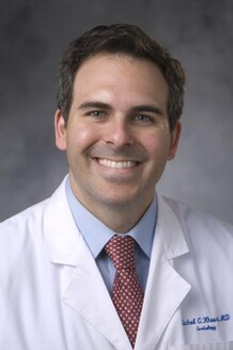Cardiac Amyloidosis Overview
Learn About Cardiac Amyloidosis
Cardiac amyloidosis is a disorder caused by deposits of an abnormal protein (amyloid) in the heart tissue. These deposits make it hard for the heart to work properly.
Amyloidosis - cardiac; Primary cardiac amyloidosis - AL type; Secondary cardiac amyloidosis - AA type; Stiff heart syndrome; Senile amyloidosis
Amyloidosis is a group of diseases in which clumps of proteins called amyloid build up in body tissues. Over time, these proteins replace normal tissue, leading to failure of the involved organ. There are many forms of amyloidosis.
Cardiac amyloidosis ("stiff heart syndrome") occurs when amyloid deposits take the place of normal heart muscle. It is the most typical type of restrictive cardiomyopathy. Cardiac amyloidosis may affect the way electrical signals move through the heart (conduction system). This can lead to abnormal heartbeats (arrhythmias) and faulty heart signals (heart block).
The condition can be inherited. This is called familial cardiac amyloidosis. It can also develop as the result of another disease such as a type of bone and blood cancer, or as the result of another medical problem causing inflammation. Cardiac amyloidosis is more common in men than in women. The disease is rare in people under age 40.
Some people may have no symptoms. When present, symptoms may include:
- Excessive urination at night
- Fatigue, reduced exercise ability
- Palpitations (sensation of feeling heartbeat)
- Shortness of breath with activity
- Swelling of the abdomen, legs, ankles, or other part of the body
- Trouble breathing while lying down
Your health care provider may tell you to make changes to your diet, including limiting salt and fluids.
You may need to take water pills (diuretics) to help your body get rid of excess fluid. Your provider may tell you to weigh yourself every day. A weight gain of 3 or more pounds (1 kilogram or more) over 1 to 2 days can mean there is too much fluid in the body.
Medicines including digoxin, calcium-channel blockers, and beta-blockers may be used in people with atrial fibrillation. However, the medicines must be used with caution, and the dosage must be carefully monitored. People with cardiac amyloidosis may be extra sensitive to side effects of these medicines.
Other treatments may include:
- Chemotherapy
- Drugs that target the abnormal protein (tafamidis)
- Implantable cardioverter-defibrillator (AICD)
- Pacemaker, if there are problems with heart signals
- Prednisone, an anti-inflammatory medicine
A heart transplant may be considered for people with some types of amyloidosis who have very poor heart function. People with hereditary amyloidosis may need a liver transplant.
Saint Francis Medical Center
Daniel Lenihan is an Advanced Heart Failure and Transplant Cardiologist and a Cardiologist in Cape Girardeau, Missouri. Dr. Lenihan is rated as an Elite provider by MediFind in the treatment of Cardiac Amyloidosis. His top areas of expertise are Cardiac Amyloidosis, Primary Amyloidosis, Heart Failure, Cardiomyopathy, and Heart Transplant. Dr. Lenihan is currently accepting new patients.
Duke Cardiology Clinic - Clinic 2F/2G
Michel Khouri is an Advanced Heart Failure and Transplant Cardiologist and a Cardiologist in Durham, North Carolina. Dr. Khouri is rated as an Elite provider by MediFind in the treatment of Cardiac Amyloidosis. His top areas of expertise are Cardiac Amyloidosis, Transthyretin Amyloid Cardiomyopathy, Heart Failure, Cardiac Ablation, and Orchiectomy. Dr. Khouri is currently accepting new patients.
The University Of Chicago
Nitasha Sarswat is a Cardiologist and an Advanced Heart Failure and Transplant Cardiologist in Chicago, Illinois. Dr. Sarswat is rated as an Elite provider by MediFind in the treatment of Cardiac Amyloidosis. Her top areas of expertise are Cardiac Amyloidosis, Heart Failure, Primary Amyloidosis, Heart Transplant, and Tissue Biopsy. Dr. Sarswat is currently accepting new patients.
In the past, cardiac amyloidosis was thought to be an untreatable and rapidly fatal disease. However, the field is changing rapidly. Different types of amyloidosis can affect the heart in different ways. Some types are more severe than others. Many people can now expect to survive and experience a good quality of life for several years after diagnosis.
Complications may include:
- Atrial fibrillation or ventricular arrhythmias
- Congestive heart failure
- Fluid buildup in the abdomen (ascites)
- Increased sensitivity to digoxin
- Low blood pressure and dizziness from excessive urination (due to medicine)
- Sick sinus syndrome
- Symptomatic cardiac conduction system disease (arrhythmias related to abnormal conduction of impulses through the heart muscle)
Contact your provider if you have this disorder and develop new symptoms such as:
- Dizziness when you change position
- Excessive weight (fluid) gain
- Excessive weight loss
- Fainting spells
- Severe breathing problems
Summary: Tne aim purpose of this observational, multicentre and propective study is to determine the prevalence of cardiac amyloidosis in geriatric patients aged 80 years and older hospitalized within the last 12 months for heart failure with left ventricular hypertrophy (septum ≥ 12 mm) on echocardiography
Summary: The goal of this clinical trial is to investigate whether new imaging techniques can help us to better understand the cardiac amyloidosis. The disease can be slowed down with various medications (e.g., tafamidis, acoramidis, or vutrisiran). However, treatment is not effective in all patients-in about one-third of cases, the disease continues to progress. So far, we know little about the exact caus...
Published Date: May 08, 2024
Published By: Thomas S. Metkus, MD, Assistant Professor of Medicine and Surgery, Johns Hopkins University School of Medicine, Baltimore, MD. Also reviewed by David C. Dugdale, MD, Medical Director, Brenda Conaway, Editorial Director, and the A.D.A.M. Editorial team.
Elliott PM, Olivotto I. Diseases of the myocardium and endocardium. In: Goldman L, Cooney KA, eds. Goldman-Cecil Medicine. 27th ed. Philadelphia, PA: Elsevier; 2024:chap 47.
Hershberger RE. The dilated, restrictive, and infiltrative cardiomyopathies. In: Libby P, Bonow RO, Mann DL, Tomaselli GF, Bhatt DL, Solomon SD, eds. Braunwald's Heart Disease: A Textbook of Cardiovascular Medicine. 12th ed. Philadelphia, PA: Elsevier; 2022:chap 52.

